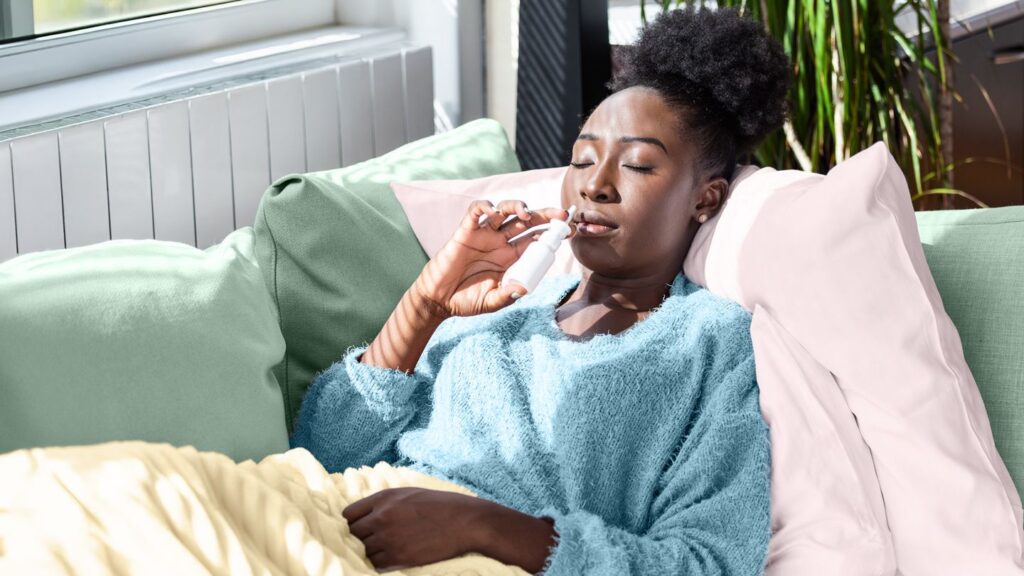You may already be using the over-the-counter nasal spray azelastine (Astepro) to relieve allergy symptoms, like sneezing, a stuffy nose, and watery eyes.
[1]
A new clinical trial suggests this antihistamine may also help prevent COVID-19.
[2]
The study, published in JAMA Internal Medicine, found that the incidence of COVID-19 was significantly lower with application of azelastine nasal spray compared with a placebo treatment, says study author Peter Meiser, PhD, a representative of the pharmaceutical company and study sponsor Ursapharm Arzneimittel in Saarbruecken, Germany.
“We consider azelastine nasal spray, based on its established safety profile, over-the-counter availability, and ease of use, as a practical, scalable, on-demand approach” to preventing COVID-19, particularly in high-risk settings, such as large gatherings or travel, Dr. Meiser says.
Other experts say that, while larger studies are still needed, the new investigation suggests a promising add-on to existing preventive measures, especially for patients already relying on nasal sprays for allergy relief. “I’ll be following my patients who use the drug closer than ever,” says Julia Sohn, MD, an allergist and immunologist at AllerVie Health in Washington, DC, who wasn’t involved in the research.
What Is Azelastine?
Azelastine is an antihistamine that was approved by the U.S. Food and Drug Administration in the mid-1990s and became available over-the-counter in 2021, says Dr. Sohn.
[3]
[4]
“We typically recommend one to two sprays in each nostril twice daily for nasal and ocular [eye] symptoms of environmental allergies,” such as seasonal allergies from pollen and other irritants, she says.
The medication works by destabilizing mast cells, or allergy cells, to decrease allergic inflammation, says Rauno Joks, MD, an allergist and immunologist at NYC Health + Hospitals/Kings County in Brooklyn, New York, who was not involved in the study.
The spray decreases sneezing, runny nose, and post-nasal drip, he says. Azelastine eye drops are also available to treat itchy, watery eyes.
Could This Nasal Spray Fight COVID?
The randomized, placebo-controlled clinical trial included 450 healthy adults, who were enrolled at Saarland University Hospital in Germany. They were randomly assigned to receive either azelastine nasal spray or a placebo three times a day for 56 days.
Study subjects received COVID rapid antigen testing twice a week, with positive results confirmed by polymerase chain reaction (PCR) tests. People with COVID symptoms but negative antigen tests got PCR tests.
COVID-19 occurred in 6.7 percent of the placebo group and 2.2 percent of the azelastine group, which Meiser says corresponds to a reduction of two-thirds.
The researchers also found significant reductions in the overall number of PCR-confirmed symptomatic infections (21 in the azelastine group compared with 49 in the placebo group), Meiser says. Additionally, there was a lower incidence of rhinovirus infections (such as those that cause the common cold).
Exactly why azelastine may prevent COVID is unclear. Meiser says previous studies have shown that the medication may inhibit the coronavirus from entering the body and replicating.
[5]
“Larger trials still need to increase our knowledge on this approach,” he says.
Should You Use Azelastine to Protect Yourself Against COVID?
Azelastine is generally safe to use daily, Sohn says. Using the medication at higher-than-typical doses, as the study suggests, “may be particularly applicable to high-risk settings such as large gatherings or travel,” she adds.
Side effects of azelastine are uncommon but can include nose bleeds, headaches, and fatigue — and, Sohn notes, anyone experiencing these symptoms should stop using it. It may also interfere with other medications, so talk to your doctor before trying it if you take other drugs.
[1]
The nasal spray also has a bitter aftertaste, Dr. Joks says.
Joks emphasizes that the nasal spray shouldn’t replace getting a COVID vaccine, which boosts the body’s immune response to prevent an infection from taking hold and causing serious illness.
Azelastine also shouldn’t replace measures to prevent COVID-19, like hand washing, wearing masks, and staying home when you’re sick, Sohn says.
The Study Has Limitations
This trial was relatively small, and its statistical power was reduced because of the low number of infections, Meiser says.
Results may not be applicable to everyone. Most participants in the trial were female; the average age was 33; and 92 percent were white.
The study only took place at a single medical center with a mostly healthy and vaccinated population, and researchers noted the generalizability of the findings to other settings may be limited.
Another possible flaw of the study is that azelastine’s bitter taste may have “unblinded” participants, potentially introducing a bias, the authors say.
Larger trials are needed to confirm the efficacy of azelastine against COVID-19 and to explore the medication’s potential benefits against other respiratory illnesses across more diverse populations and settings, Meiser says. That is especially important for patients at higher risk of serious complications from COVID-19, such as seniors and people with certain medical conditions.

